- Home
- Patrick O'Brian
Master and Commander Page 3
Master and Commander Read online
Page 3
Now he was in the square, with its noble trees and its great twin staircases winding down to the quay—stairs known to British sailors for a hundred years as Pigtail Steps, the cause of many a broken limb and battered head. He crossed it to the low wall that ran between the stair-heads and looked out over the immense expanse of enclosed water before him, stretching away left-handed to the distant top of the harbour and right-handed past the hospital island miles away to its narrow, castle-guarded mouth. To his left lay the merchantmen: scores and, indeed, hundreds of feluccas, tartans, xebecs, pinks, polacres, polacre-settees, houarios and barca-longas—all the Mediterranean rigs and plenty from the northern seas as well—bean-cods, cats, herring-busses. Opposite him and to his right lay the men-of-war: two ships of the line, both seventy-fours; a pretty twenty-eight gun frigate, the Niobe, whose people were painting a vermilion band under the chequered line of her gun-ports and up over her delicate transom, in imitation of a Spanish ship her captain had admired; and a number of transports and other vessels; while between them all and the steps up to the quay, innumerable boats plied to and fro—long-boats, barges from the ships of the line, launches, cutters, yawls and gigs, right down to the creeping jolly-boat belonging to the Tartarus bomb-ketch, with her enormous purser weighing it down to a bare three inches off the water. Still farther to the right the splendid quay curved away towards the dockyard, the ordnance and victualling wharfs and the quarantine island, hiding many of the other ships: Jack stared and craned with one foot on the parapet in the hope of catching a glimpse of his joy; but she was not to be seen. He turned reluctantly away to the left, for that Was where Mr Williams' office lay. Mr Williams was the Mahon correspondent of Jack's prize-agent in Gibraltar, the eminently respectable house of Johnstone and Graham, and his office was the next and most necessary port of call; for besides feeling that it was ridiculous to have gold on his shoulder but none to jingle in his pocket, Jack would presently need ready money for a whole series of grave and unavoidable expenses—customary gifts, douceurs and the like, which could not possibly be done on credit.
He walked in with the utmost confidence, as if he had just won the battle of the Nile in person, and he was very well received: when their business was over the agent said, 'I suppose you have seen Mr Baldick?'
'The Sophie's lieutenant?'
'Just so.'
'But he has gone with Captain Allen—he is aboard the Pallas.'
'There, sir, you are mistaken, if I may say so, in a manner of speaking. He is in the hospital.'
'You astonish me.'
The agent smiled, raising his shoulders and spreading his hands in a deprecating gesture: he possessed the true word and Jack had to be astonished; but the agent begged pardon for his superiority. 'He came ashore late yesterday afternoon and was taken to the hospital with a low fever—the little hospital up past the Capuchins, not the one on the island. To tell you the truth'—the agent held the flat of his hand in front of his mouth as a token of secrecy and spoke in a lower tone—'he and the Sophie's surgeon did not see eye to eye, and the prospect of a cruise under his hands was more than Mr Baldick could abide. He will rejoin at Gib, no doubt, as soon as he is better. And now, Captain,' said the agent, with an unnatural smile and a shifty look, 'I am going to make so bold as to ask you a favour, if I may. Mrs Williams has a young cousin who is with child to go to sea—wants to be a purser later on. He is a quick boy and he writes a good clear hand; he has worked in the office here since Christmas and I know he is clever at figures. So, Captain Aubrey, sir, if you have no one else in mind for your clerk, you would infinitely oblige . . .' The agent's smile came and went, came and went: he was not used to be on the asking side in a favour, not with sea officers, and he found the possibility of a refusal wonderfully unpleasant.
'Why,' said Jack, considering, 'I have no one in mind, to be sure. You answer for him, of course? Well then, I tell you what, Mr Williams, you find me an able seaman to come along with him and I'll take your boy.'
'Are you in earnest, sir?'
'Yes . . . yes, I suppose I am. Yes: certainly.'
'Done, then,' said the agent, holding out his hand. 'You won't regret it, sir, I give you my word.'
'I'm sure of it, Mr Williams. Perhaps I had better have a look at him.'
David Richards was a plain, colourless youth—literally colourless except for some mauve pimples—but there was something touching in his intense, repressed excitement and his desperate eagerness to please. Jack looked at him kindly and said, 'Mr Williams tells me you write a fine clear hand, sir. Should you like to take down a note for me? It is addressed to the master of the Sophie. What's the master's name, Mr Williams?'
'Marshall, sir, William Marshall. A prime navigator, I hear.'
'So much the better,' said Jack, remembering his own struggles with the Requisite Tables and the bizarre conclusions he had sometimes reached. 'To Mr William Marshall, then, Master of His Majesty's sloop the Sophie. Captain Aubrey presents his compliments to Mr Marshall and will come aboard at about one o'clock in the afternoon. There, that should give them decent warning. Very prettily written, too. You will see that it reaches him?'
'I shall take it myself this minute, sir,' cried the youth, an unhealthy red with pleasure.
'Lord,' said Jack to himself as he walked up to the hospital, gazing about him at the vast spread of severe, open, barren country on either side of the busy sea, 'Lord, what a fine thing it is to play the great man, once in a while.'
'Mr Baldick?' he said. 'My name is Aubrey. Since we were so nearly shipmates I have called in to ask how you do. I hope I see you on the way to recovery, sir?'
'Very kind in you, sir,' cried the lieutenant, a man of fifty whose crimson face was covered with a silvery glinting stubble, although his hair was black, 'more than kind. Thankee, thankee, Captain. I am far better, I am glad to say, now I am out of the clutches of that bloody-minded sawbones. Would you credit it, sir? Thirty-seven years in the service, twenty-nine of them as a commissioned officer, and I am to be treated to the water-cure and a low diet. Ward's pill and Ward's drop are no good—quite exploded, we hear: but they saw me through the West Indies in the last war, when we lost two-thirds of the larboard watch in ten days from the yellow jack. They preserved me from that, sir, to say nothing of scurvy, and sciatica, and rheumatism, and the bloody flux; but they are of no use, we are told. Well, they may say what they please, these jumped-up young fellows from the Surgeons' Hall with the ink scarcely dry on their warrants, but I put my faith on Ward's drop.'
'And in Brother Bung,' remarked Jack privately, for the place smelt like the spirit-room of a first-rate. 'So the Sophie has lost her surgeon,' he said aloud, 'as well as the more valuable members of her crew?'
'No great loss, I do assure you, sir: though, indeed, the ship's company did make great case of him—swore by him and his silly nostrums, the damned set of gables; and were much distressed at his going off. And how ever you will replace him in the Med I do not know, by the by, such rare birds they are. But he's no great loss, whatever they may say: and a chest of Ward's drop will answer just as well; nay, better. And the carpenter for amputations. May I offer you a glass, sir?' Jack shook his head. 'As for the rest,' the lieutenant went on, 'we really were very moderate. The Pallas has close on her full complement. Captain A only took his nephew and a friend's son and the other Americans, apart from his cox'n and his steward. And his clerk.'
'Many Americans?'
'Oh no, not above half a dozen. All people from his own part—the country up behind Halifax.'
'Well, that's a relief, upon my word. I had been told the brig was stripped.'
'Who told you that, sir?'
'Captain Harte.'
Mr Baldick narrowed his lips and sniffed. He hesitated and took another pull at his mug; but he only said, 'I've known him off and on these thirty years. He is very fond of practising upon people: by way of having a joke, no doubt.' While they contemplated Captain Harte's devious sense of fun, Mr Baldic
k slowly emptied his mug. 'No,' he said, setting it down, 'we've left you what might be called a very fair crew. A score or two of prime seamen, and a good half of the people real man-of-war's men, which is more than you can say for most line of battle ships nowadays. There are some untoward sods among the other half, but so there are in every ship's company—by the by, Captain A left you a note about one of 'em—Isaac Wilson, ordinary—and at least you have no damned sea-lawyers aboard. Then there are your standing officers: right taut old-fashioned sailormen, for the most part. Watt, the boson, knows his business as well as any man in the fleet. And Lamb, the carpenter, is a good, steady fellow, though maybe a trifle slow and timid. George Day, the gunner—he's a good man, too, when he's well, but he has a silly way of dosing himself. And the purser, Ricketts, is well enough, for a purser. The master's mates, Pullings and young Mowett, can be trusted with a watch: Pullings passed for a lieutenant years ago, but he has never been made. And as for the youngsters, we've only left you two, Ricketts' boy and Babbington. Blockheads, both of them; but not blackguards.'
'What about the master? I hear he is a great navigator.'
'Marshall? Well, so he is.' Again Mr Baldick narrowed his lips and sniffed. But by now he had drunk a further pint of grog, and this time he said, 'I don't know what you think about this buggery lark, sir; but I think it's unnatural.'
'Why, there is something in what you say, Mr Baldick,' said Jack. Then, feeling the weight of interrogation still upon him, he added, 'I don't like it—not my line at all. But I must confess I don't like to see a man hanged for it. The ship's boys, I suppose?'
Mr Baldick slowly shook his head fur some time. 'No,' he said at last. 'No. I don't say he does anything. Not now. But come, I do not like to speak ill of a man behind his back.'
'The good of the service . . .' said Jack, with a general wave of his hand; and shortly afterwards he took his leave, for the lieutenant had come out in a pale sweat; was poorly, lugubrious and intoxicated.
The tramontana had freshened and now it was blowing a two-reef topsail breeze, rattling the fronds of the palms; the sky was clear from rim to rim; a short, choppy sea was getting up outside the harbour, and now there was an edge to the hot air like salt or wine. He tapped his hat firmly on his head, filled his lungs and said aloud, 'Dear God, how good it is to be alive.'
He had timed it well. He would pass by the Crown, make sure that dinner would be suitably splendid, brush his coat and maybe drink a glass of wine: he would not have to pick up his commission, for it had never left him—there it was against his bosom, crackling gently as he breathed.
Walking down at a quarter to one, walking down to the waterside with the Crown behind him, he felt a curious shortness of his breath; and as he sat in the waterman's boat he said nothing but the word 'Sophie', for his heart was beating high, and he had a curious difficulty in swallowing. 'Am I afraid?' he wondered. He sat looking gravely at the pommel of his sword, scarcely aware of the boat's smooth passage down the harbour, among the crowded ships and vessels, until the Sophie's side rose in front of him and the waterman rattled his boathook.
A quick automatic searching look showed him yards exactly squared, the side dressed, ship's boys in white gloves running down with baize-covered side-ropes, the bosun's call poised, winking silver in the sun. Then the boat's motion stopped, there was the faint crunch as it touched the sloop, and he went up the side to the weird screaming of the call. As his foot touched the gangway there was the hoarse order, the clump and crash of the marines presenting arms, and every officer's hat flew off; and as he stepped upon the quarterdeck he raised his own.
The warrant-officers and midshipmen were drawn up in their best uniforms, blue and white on the shining deck, a less rigid group than the scarlet rectangle of the marines. Their eyes were fixed very attentively on their new commander. He looked grave and; indeed, rather stern: after a second's pause in which the boatman's voice could be heard over the side, muttering to himself, he said, 'Mr Marshall, name the officers to me, if you please.'
Each came forward, the purser, the master's mates, the midshipmen, the gunner, the carpenter and the bosun, and each made his bow, intently watched by the crew. Jack said, 'Gentlemen, I am happy to make your acquaintance. Mr Marshall, all hands aft, if you please. As there is no lieutenant I shall read my commission to the ship's company myself.'
There was no need to turn anybody up from below: every man was there, washed and shining, staring hard. Nevertheless, the calls of the bosun and his mates piped All hands aft for a good half-minute down the hatchways. The shrilling died away. Jack stepped forward to the break of the quarter-deck and took out his commission. As soon as it appeared there came the order 'Off hats', and be began in a firm but somewhat forced and mechanical voice.
'By the right Honourable Lord Keith . . .'
As he ran through the familiar lines, now so infinitely more full of meaning, his happiness returned, welling up through the gravity of the occasion, and he rolled out the Hereof nor you nor any of you may fail as you will answer the contrary at your peril' with a fine relish. Then he folded the paper, nodded to the men and returned it to his pocket. 'Very good,' he said. 'Dismiss the hands and we will take a look at the brig.'
In the hushed ceremonial procession that followed Jack saw exactly what he had expected to see—a vessel ready for inspection, holding her breath in case any of her beautifully trim rigging with its geometrically perfect fakes and perpendicular falls should be disturbed. She bore as much resemblance to her ordinary self as the rigid bosun, sweating in a uniform coat that must have been shaped with an adze, did to the same man in his shirt-sleeves, puddening the topsail yard in a heavy swell; yet there was an essential relationship, and the snowy sweep of the deck, the painful brilliance of the two brass quarter-deck four-pounders, the precision of the cylinders in the cable-tier and the parade-ground neatness of the galley's pots and tubs all had a meaning. Jack had whited too many sepulchres to be easily deceived; and he was pleased with what he saw. He saw and appreciated all he was meant to see. He was blind to the things he was not meant to see—the piece of ham that an officious fo'c'sle cat dragged from behind a bucket, the girls the master's mates had hidden in the sail-room and who would keep peeping out from behind mounds of canvas. He took no notice of the goat abaft the manger, that fixed him with an insulting devilish split-pupilled eye and defecated with intent; nor of the dubious object, not unlike a pudding, that someone in a last-minute panic had wedged beneath the gammoning of the bowsprit.
Yet his was an eminently professional eye—it had been nominally atsea since he was nine and, in fact, since he was twelve—and it picked up a great many other impressions. The master was not at all what he had expected, but a big, good-looking, capable middle-aged man—the sodden Mr Baldick had probably got the whole thing wrong. The bosun was: his character was written in his rigging—cautious, solid, conscientious, traditional. The purser and the gunner neither here nor there, though indeed the gunner was obviously too ill to do himself justice, and half-way through he quietly vanished. The midshipmen were more presentable than he had expected: brig's and cutter's midshipmen were often a pretty squalid lot. But that child, that youngster Babbington, could not be allowed ashore in those garments: his mother must have counted upon a growth that had not taken place, and he was so extinguished by his hat alone that it would bring discredit to the sloop.
His chief impression was of old-fashionedness: the Sophie had something archaic about her, as though she would rather have her bottom hobnailed than coppered, and would rather pay her sides than paint them. Her crew, without being at all elderly—indeed, most of the hands were in their twenties—had an old-fashioned look; some were wearing petticoat-breeches and shoes, a rig that had already grown uncommon when he was a midshipman no bigger than little Babbington. They moved about in an easy, unconstrained manner, he noticed: they seemed decently curious, but not in the least bloody-minded, resentful or cowed.
Yes: old-fashioned. H
e loved her dearly—had loved her from the moment his eye first swept along her sweetly curving deck—but calm intelligence told him that she was a slow brig, an old brig and a brig that was very unlikely to make his fortune. She had fought a couple of creditable actions under his predecessor, one against a French twenty-gun ship-rigged privateer from Toulon, and the other in the Gut of Gibraltar, protecting her convoy from a swarm of Algeciras gunboats rowing out in a calm; but as far as he could remember she had never taken a prize of any real value.
They were back at the break of the odd Little quarter-deck—it was really more like a poop—and bending his head he stepped into the cabin. Crouching low, he made his way to the lockers beneath the stern-windows that stretched from one side to the other of the after end—an elegant, curving frame for an extraordinarily brilliant, Canaletto view of Port Mahon, all lit with the silent noon-day sun and (seen from this comparative dimness) belonging to a different world. Sitting down with a cautious sideways movement he found he could hold his head up with no difficulty at all—a good eighteen inches to spare—and he said, 'There we are, Mr Marshall. I must congratulate you upon the Sophie's appearance. Very trim: very shipshape.' He thought he might go as far as that, so long as he kept his voice quite official, but he was certainly not going to say any more; nor was he going to address the men or announce any indulgence to mark the occasion. He loathed the idea of a 'popular' captain. 'Thank you, sir,' said the master.
'Now I am going ashore. But I shall sleep aboard, of course; so pray be good enough to send a boat for my chest and dunnage. I am at the Crown.'
He sat on for a while, savouring the glory of his day-cabin. It had no guns in it, for the peculiar build of the Sophie would have brought their muzzles to within six inches of the surface if there had been, and the two four-pounders that would ordinarily have taken up so much space were immediately over his head; but even so there was not much room, and one table running athwart was all that the cabin would hold, apart from the lockers. Yet it was far more than he had ever owned before, at sea, and he surveyed it with glowing complacency, looking with particular delight at the handsomely mounted inward-sloping windows, all as bright as glass could very well be, seven sets of panes in a noble sweep quite furnishing the room.

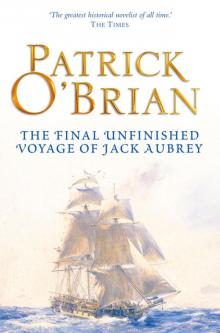 The Final Unfinished Voyage of Jack Aubrey
The Final Unfinished Voyage of Jack Aubrey The Rendezvous and Other Stories
The Rendezvous and Other Stories Caesar: The Life Story of a Panda-Leopard
Caesar: The Life Story of a Panda-Leopard The Hundred Days
The Hundred Days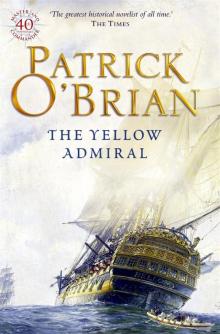 The Yellow Admiral
The Yellow Admiral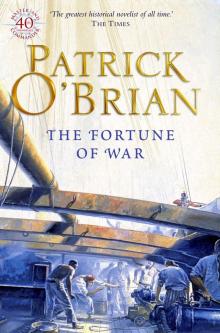 The Fortune of War
The Fortune of War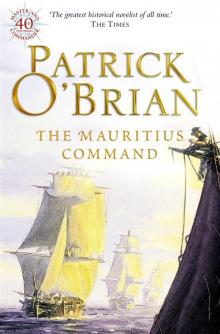 The Mauritius Command
The Mauritius Command Beasts Royal: Twelve Tales of Adventure
Beasts Royal: Twelve Tales of Adventure A Book of Voyages
A Book of Voyages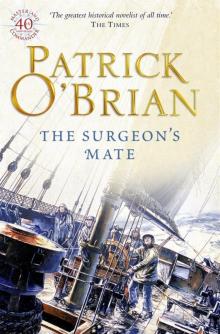 The Surgeon's Mate
The Surgeon's Mate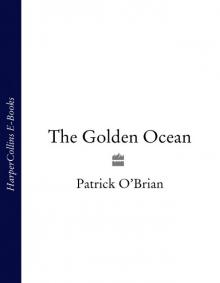 The Golden Ocean
The Golden Ocean Hussein: An Entertainment
Hussein: An Entertainment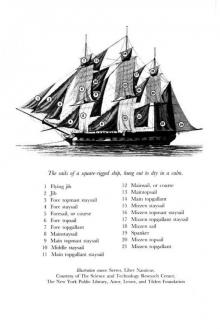 H.M.S. Surprise
H.M.S. Surprise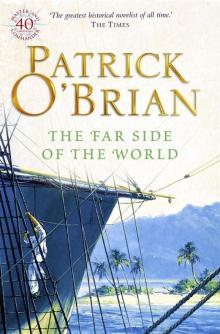 The Far Side of the World
The Far Side of the World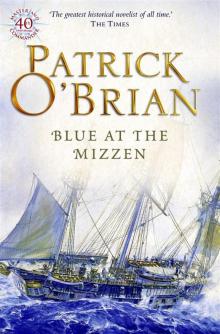 Blue at the Mizzen
Blue at the Mizzen The Unknown Shore
The Unknown Shore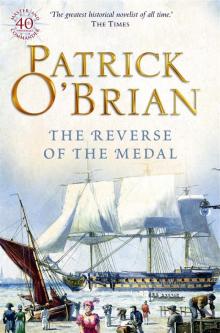 The Reverse of the Medal
The Reverse of the Medal Testimonies
Testimonies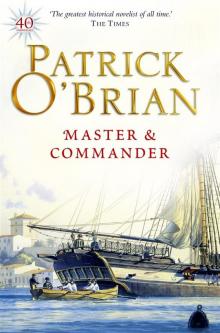 Master and Commander
Master and Commander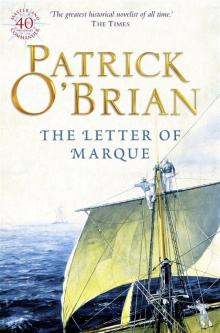 The Letter of Marque
The Letter of Marque Treason's Harbour
Treason's Harbour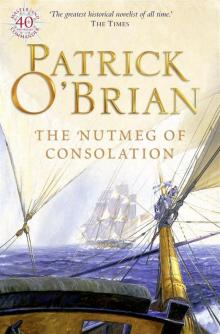 The Nutmeg of Consolation
The Nutmeg of Consolation 21: The Final Unfinished Voyage of Jack Aubrey
21: The Final Unfinished Voyage of Jack Aubrey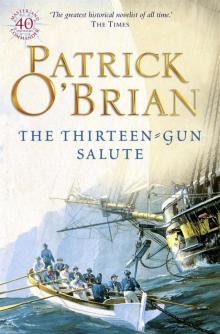 The Thirteen-Gun Salute
The Thirteen-Gun Salute The Ionian Mission
The Ionian Mission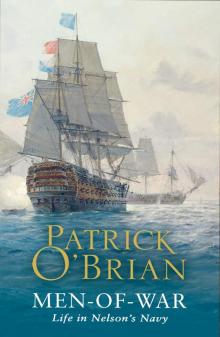 Men-of-War
Men-of-War The Commodore
The Commodore The Catalans
The Catalans Aub-Mat 08 - The Ionian Mission
Aub-Mat 08 - The Ionian Mission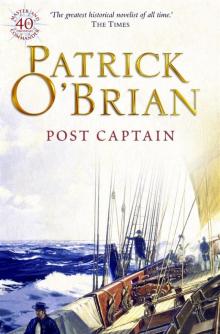 Post Captain
Post Captain The Road to Samarcand
The Road to Samarcand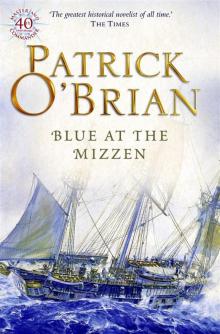 Book 20 - Blue At The Mizzen
Book 20 - Blue At The Mizzen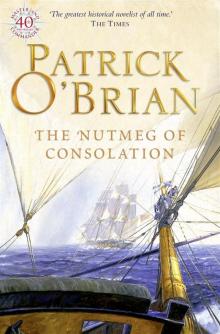 Book 14 - The Nutmeg Of Consolation
Book 14 - The Nutmeg Of Consolation Caesar
Caesar The Wine-Dark Sea
The Wine-Dark Sea Book 8 - The Ionian Mission
Book 8 - The Ionian Mission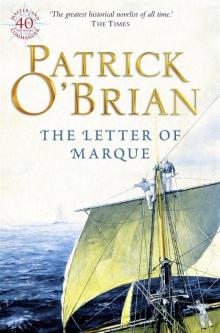 Book 12 - The Letter of Marque
Book 12 - The Letter of Marque Hussein
Hussein Book 9 - Treason's Harbour
Book 9 - Treason's Harbour Book 19 - The Hundred Days
Book 19 - The Hundred Days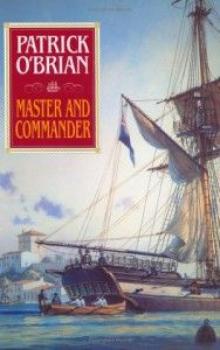 Master & Commander a-1
Master & Commander a-1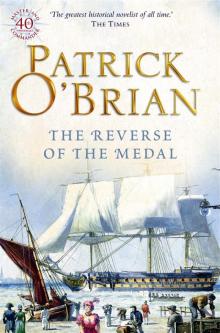 Book 11 - The Reverse Of The Medal
Book 11 - The Reverse Of The Medal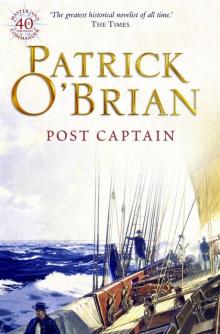 Book 2 - Post Captain
Book 2 - Post Captain The Truelove
The Truelove The Thirteen Gun Salute
The Thirteen Gun Salute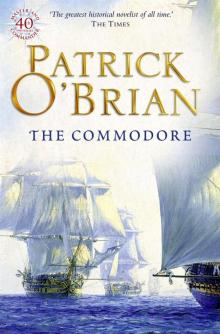 Book 17 - The Commodore
Book 17 - The Commodore The Final, Unfinished Voyage of Jack Aubrey
The Final, Unfinished Voyage of Jack Aubrey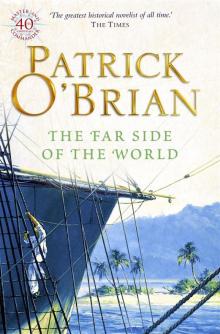 Book 10 - The Far Side Of The World
Book 10 - The Far Side Of The World Book 5 - Desolation Island
Book 5 - Desolation Island Beasts Royal
Beasts Royal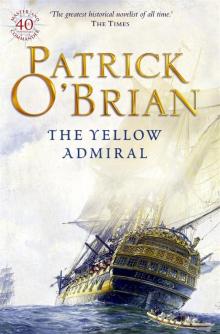 Book 18 - The Yellow Admiral
Book 18 - The Yellow Admiral Book 15 - Clarissa Oakes
Book 15 - Clarissa Oakes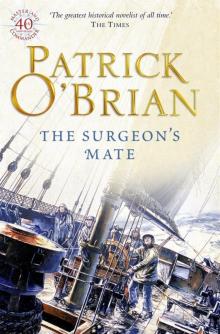 Book 7 - The Surgeon's Mate
Book 7 - The Surgeon's Mate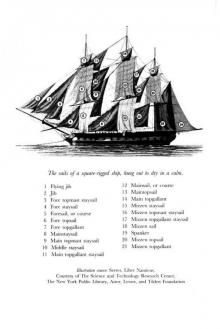 Book 3 - H.M.S. Surprise
Book 3 - H.M.S. Surprise Desolation island
Desolation island Picasso: A Biography
Picasso: A Biography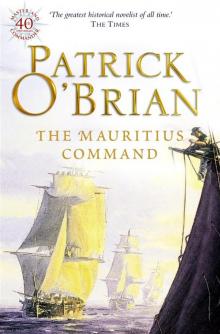 Book 4 - The Mauritius Command
Book 4 - The Mauritius Command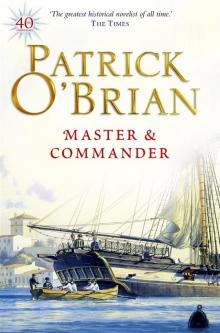 Book 1 - Master & Commander
Book 1 - Master & Commander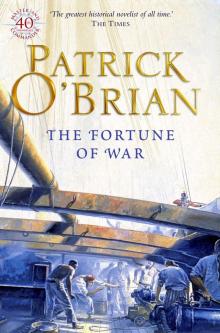 Book 6 - The Fortune Of War
Book 6 - The Fortune Of War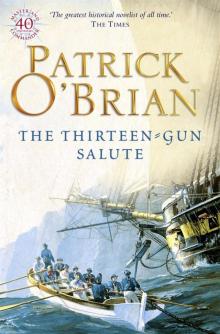 Book 13 - The Thirteen-Gun Salute
Book 13 - The Thirteen-Gun Salute Book 16 - The Wine-Dark Sea
Book 16 - The Wine-Dark Sea